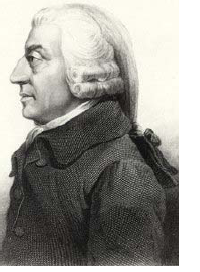Adam Smith’s ‘Invisible Hand’
Adam Smith (1723–90) was a Scottish philosopher whose Inquiry into the Nature and Causes of the Wealth of Nations, first published in 1776, is regarded as the first and clearest rationale for free market economics and political liberalism. He did not believe that government could or should interfere in society in order to benefit its people. He argued that the wealth of a nation and the interests of society were best served by the ‘invisible hand’ of self-interest in the exchange of goods and services in the market. Governments could not do as good a job as the market, and so should be ‘parsimonious’—modest, small and interfering minimally in society. Smith defined liberalism as a society that regulates itself through the market, individuals serving the social good by pursuing self-interest, with the state intervening only minimally.

The difference between the most dissimilar characters, between a philosopher and a common street porter, for example, seems to arise not so much from nature, as from custom, habit, and education. When they came into the world, they were, perhaps, very much alike, and neither their parents nor play-fellows could perceive any remarkable difference. About that age, or soon after, they come to be employed in very different occupations. The difference of talents comes then to be taken notice of, and widens by degrees, till at last the vanity of the philosopher is willing to acknowledge scarce any resemblance. But without the disposition to truck, barter and exchange, every man must have procured to himself every necessary and conveniency of life which he wanted. All must have had the same duties to perform, and the same work to do … As it is this disposition which forms that difference of talents…so it is this same disposition that renders the difference useful … Among men, the most dissimilar geniuses are of use to one another; the different produces of their respective talents, by the general disposition to truck, barter, and exchange, being brought, as it were, into common stock, where every man may purchase whatever part of the produce of other men’s talents he has occasion for.
[M]an has almost constant occasion for the help of his brethren, and it is in vain for him to expect it from their benevolence only. He will be more likely to prevail if he can influence their self-love in his favour … It is not from the benevolence of the butcher, the brewer or the baker that we expect our dinner, but from regard to their own self-interest. We address ourselves, not to their humanity but to their self-love, and never talk to them of our own necessities but of their advantages. Nobody but the beggar chuses to depend chiefly on the benevolence of his fellow citizens …
[E]very individual … neither intends to promote the publick interest, nor knows how much he is promoting it … [By] directing that industry in such a manner as its produce may be of the greatest value, he intends only his own gain, and he is in this, as in many other cases, led by an invisible hand to promote an end that was no part of his intention … By promoting his own interest he frequently promotes that of society more effectually than when he really intends to promote it.
Smith, Adam. 1776 (1976). An Inquiry into the Nature and Causes of the Wealth of Nations. Oxford: Clarendon Press. pp. 38–40, 26–27, 455–456. || Amazon || WorldCat
